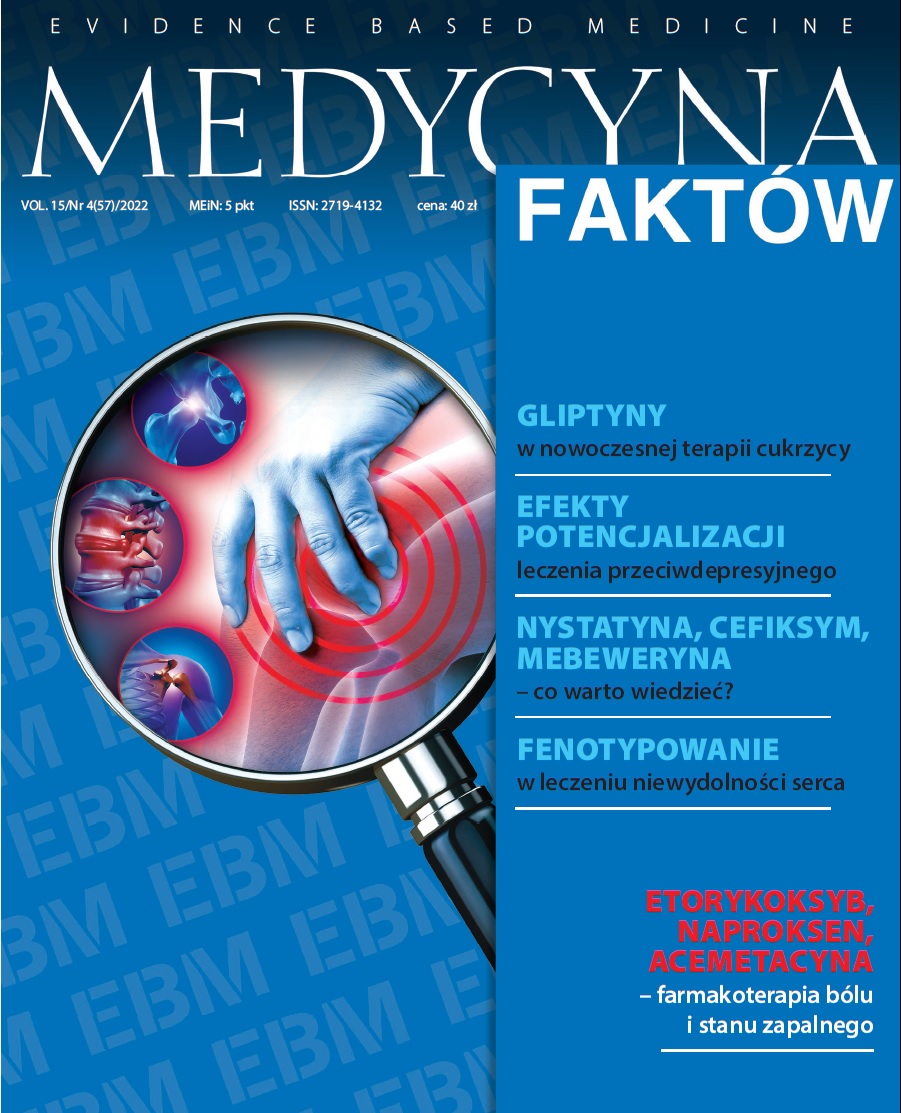When do I choose mebeverine? Review article
Main Article Content
Abstract
Irritable bowel syndrome (IBS) is one of the most common functional disorders of the gastrointestinal tract, which is still a diagnostic and therapeutic problem. Current scientific data in relation to pharmacotherapy suggest high effectiveness of antispasmodic treatment, e.g. mebeverine in combination with other prokinetic and reliever drugs used on an ad hoc basis and anxiolytics if necessary, not forgetting about individual diet and lifestyle modification. IBS is still a diagnostic challenge due to the dynamically changing clinical picture and interdisciplinarity of the disease, it is a diagnosis of exclusion, where the treatment is adjusted to the currently dominant symptoms.
Article Details
How to Cite
Waśko-Czopnik , D. (2022). When do I choose mebeverine?. Medycyna Faktow (J EBM), 15(4(57), 386-392. https://doi.org/10.24292/01.MF.0422.1
Issue
Section
Articles
Copyright © by Medical Education. All rights reserved.
References
1. Canavan C, West J, Card T. The epidemiology of irritable bowel syndrome. Clin Epidemiol. 2014; 7: 71-80.
2. Canon M, Ruiz AJ, Rondon M et al. Prevalence of irritable bowel syndrome and health related quality of life in adults aged 18 to 30 years in a Colombian University: an electronic survey. Am J Gastroenterol. 2017; 30: 67-75.
3. Sperber AD, Dumitrascu D, Fukudo S et al. The global prevalence of IBS in adults remains elusive due to heterogeneity of studies: a Rome Foundation working team literature review. Gut. 2017; 66: 1075-82.
4. Mulak A, Smereka A, Paradowski L. Nowości i modyfikacje w Kryteriach Rzymskich IV. Gastroenterologia Kliniczna. Postępy i Standardy. 2016; 8(2).
5. Drossman DA. Functional Gastrointestinal Disorders: History, Pathophysiology, Clinical Features and Rome IV. Gastroenterology. 2016; 150: 1262-79.
6. Lacy BE, Mearin F, Chang L et al. Bowel disorders. Gastroenterology. 2016; 150: 1393-407.
7. Van Oudenhove L, Levy R, Crowlel M et al. Biopsychosocial aspects of functional gastrointestinal disorders: how central and environmental processes contribute to the development and expression of functional gastrointestinal disorders. Gastroenterology. 2016; 150: 1355-67.
8. Qin H, Cheng C, Tang X et al. Impact of psychological stress on irritable bowel syndrome. World J Gastroenterol. 2014; 20: 14126-31.
9. Borghini F, Donato G, Alvaro D et al. New insights in IBS-like disorders: Pandora’s box has been opened; a review. Gastroenterol Hepatol Bed Bench. 2017; 10(2): 79-89.
10. Ford AC, Moayyedi P, Lacy BE et al. American College of Gastroenterology monograph on the management of irritable bowel syndrome and chronic idiopathic constipation. Am J Gastroenterol. 2014; 109(suppl 1): S2-26; quiz S27.
11. Pietrzak A, Skrzydło-Radomańska B, Mulak A et al. Rekomendacje diagnostyczno-terapeutyczne w zespole jelita nadwrażliwego. Gastroenterol Rev. 2018; 13(4): 167-96.
12. Daniluk J, Małecka-Wojciesko E, Skrzydło-Radomańska B et al. The efficacy of mebeverine in the treatment of irritable bowel syndrome – a systematic review. J Clin Med. 2022; 11: 1044.
13. Darvish-Damandi M, Nikifar S, Abdollahi M. A systematic review of efficacy and tolerability of mebeverine in irritable bowel syndrome. World J Gastroenterol. 2010; 16(5): 547-53.
14. Savarino E, Zingone F, Barberio B et al. Functional bowel disorders with diarrhoea: Clinical guidelines of the United European Gastroenterology and European Society for Neurogastroenterology and Motility. United European Gastroenterol J. 2022; 10(6): 556-84.
2. Canon M, Ruiz AJ, Rondon M et al. Prevalence of irritable bowel syndrome and health related quality of life in adults aged 18 to 30 years in a Colombian University: an electronic survey. Am J Gastroenterol. 2017; 30: 67-75.
3. Sperber AD, Dumitrascu D, Fukudo S et al. The global prevalence of IBS in adults remains elusive due to heterogeneity of studies: a Rome Foundation working team literature review. Gut. 2017; 66: 1075-82.
4. Mulak A, Smereka A, Paradowski L. Nowości i modyfikacje w Kryteriach Rzymskich IV. Gastroenterologia Kliniczna. Postępy i Standardy. 2016; 8(2).
5. Drossman DA. Functional Gastrointestinal Disorders: History, Pathophysiology, Clinical Features and Rome IV. Gastroenterology. 2016; 150: 1262-79.
6. Lacy BE, Mearin F, Chang L et al. Bowel disorders. Gastroenterology. 2016; 150: 1393-407.
7. Van Oudenhove L, Levy R, Crowlel M et al. Biopsychosocial aspects of functional gastrointestinal disorders: how central and environmental processes contribute to the development and expression of functional gastrointestinal disorders. Gastroenterology. 2016; 150: 1355-67.
8. Qin H, Cheng C, Tang X et al. Impact of psychological stress on irritable bowel syndrome. World J Gastroenterol. 2014; 20: 14126-31.
9. Borghini F, Donato G, Alvaro D et al. New insights in IBS-like disorders: Pandora’s box has been opened; a review. Gastroenterol Hepatol Bed Bench. 2017; 10(2): 79-89.
10. Ford AC, Moayyedi P, Lacy BE et al. American College of Gastroenterology monograph on the management of irritable bowel syndrome and chronic idiopathic constipation. Am J Gastroenterol. 2014; 109(suppl 1): S2-26; quiz S27.
11. Pietrzak A, Skrzydło-Radomańska B, Mulak A et al. Rekomendacje diagnostyczno-terapeutyczne w zespole jelita nadwrażliwego. Gastroenterol Rev. 2018; 13(4): 167-96.
12. Daniluk J, Małecka-Wojciesko E, Skrzydło-Radomańska B et al. The efficacy of mebeverine in the treatment of irritable bowel syndrome – a systematic review. J Clin Med. 2022; 11: 1044.
13. Darvish-Damandi M, Nikifar S, Abdollahi M. A systematic review of efficacy and tolerability of mebeverine in irritable bowel syndrome. World J Gastroenterol. 2010; 16(5): 547-53.
14. Savarino E, Zingone F, Barberio B et al. Functional bowel disorders with diarrhoea: Clinical guidelines of the United European Gastroenterology and European Society for Neurogastroenterology and Motility. United European Gastroenterol J. 2022; 10(6): 556-84.

